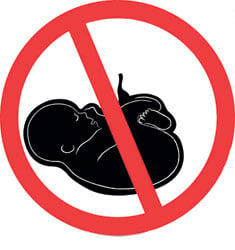This week You! talks to Dr Hurriyeh Muffedi and Dr. Tazeen Abbas who share their expert views on abortion and contraception. Read on...
This week You! talks to Dr Hurriyeh Muffedi and Dr. Tazeen Abbas who share their expert views on abortion and contraception. Read on...
They say that motherhood is a divine emotion, an incomparable feeling. However, the circumstances may not always be favourable for every woman who wishes to bring a life into this world. Given the increasing inflation and population, bearing a child seems more of a burden than a blessing. Millions of women around the globe face unplanned pregnancies every year which result in women going for induced abortions. But what many tend to ignore is the fact that induced abortion has serious repercussions on a woman’s physical and mental health.
In this regard, You! talks to Dr Hurriyeh Muffedi and Dr. Tazeen Abbas who share their expert views...
Induced abortion:
Dr Hurriyeh Muffedi has been dealing with female reproductive health related problems for over 25 years. She is associated with Sobhraj Hospital, Karachi. According to Dr Hurriyeh, “There are different kinds of abortions. We go for abortion if the foetus stops growing in the womb of the mother or there is heavy bleeding. However, the most unsafe of abortions is ‘induced abortion’ in which the woman deliberately ends her pregnancy so that it doesn’t result in the birth of a child. It is a serious crime and women should not play with their lives.”
“Sadly in our part of the world, people promote this procedure by saying that there is no life in the 6-week-old foetus. Many women resort to it despite the fact that induced abortion is forbidden in religion. And there is no legalised law about it. All qualified doctors are against this procedure which leads expectant women to go to ‘dais’ or nurses to get the abortion done. These untrained midwives usually rupture the guts and uterus. In fact at times, an expectant mother loses her life and if she survives the procedure, chances are that she will never be able to conceive again,” adds Dr. Hurriyeh.
Legitimate abortion:
However it’s not the only form of abortion available to women who want to get rid of the foetus. There are supervised abortions on which the expert opines, “This is absolutely safe as the procedure is done in a sterilized place under the supervision of qualified doctors. But let me make it very clear that this kind of abortion is only advised by a gynaecologist when the mother’s life is in danger due to the pregnancy or as I mentioned above if the foetus stops moving in the womb.”
The pills:
These days abortion pills are readily available in the country. It costs 10 rupees only and is given without any prescription. Taking such pills without prescription is illegal and wreaks havoc. A pregnant woman starts bleeding heavily as a result of this pill. And then the patients rush to the hospitals and most of the doctors deny taking up their cases.
About the abortion pills, Dr. Hurriyeh says, “This pill is for other purposes, but unfortunately lack of awareness about these things lead women to take inappropriate decisions. The abortion pill is very helpful in saving a woman who is going through post partum haemorrhage (heavy bleeding after giving birth).”
Go for contraceptives:
Being the sixth largest country in the world with a population of 194 million, it is estimated that Pakistan could become the fifth largest country by the year 2050. The biggest reasons for the increase in population are the lack of knowledge about family planning and services available to the people. And the only smartest way to control the population is by promoting family planning and introducing various contraception methods to the public.
“What needs to be done is to promote family planning methods in Pakistan. I don’t understand why people are all for abortions but deem it unreligious to opt for contraceptive methods. If you already have four children and you don’t want another baby, then go for contraceptives. It is important to plan your pregnancies. You should know whether you want a child or not. Going for induced abortion is not an option, at least in my opinion,” states Dr Hurriyeh.
 Different methods of contraception:
Different methods of contraception:
Thousands of women in our country are not aware of contraceptive methods, the result is unwanted pregnancies. And to terminate these unwanted pregnancies, women resort to untrained quacks to take care of their ‘problem’. The results, in many cases, can be disastrous and botched abortions have horrific consequences.
However, there are different types of contraception methods that can help in delaying pregnancy or even conceiving. Most of the methods are related to females. In this regard You! talks to Dr. Tazeen Abbas, Professor and Head of Department, Obstetrics and Gynaecology, KMDC and Abbasi Shaheed Hospital, Karachi. According to Dr. Tazeen, the most commonly used methods are contraceptive pills, injections, intrauterine devices (IUDs) and implant called implanons. “These methods are temporary and whenever you want to conceive all you have to do is to consult your gynaecologist.”
“Women are afraid to go for these methods because of the myths and misconceptions associated with contraception. Usually women think that they are not safe, which is absolutely false. Of course there are side effects but it varies from person to person. If a patient suffers from headaches and depression and she is taking contraceptive pills, then this would result in an increase in headaches and she might get more depressed,” tells Dr. Tazeen.
The most common contraception methods - contraceptive pills and injections - are only for females. The pills prevent the egg from being produced. It is effective 99 per cent of the time if used according to the instructions. “However, if you miss even one dose of the pill you might end up conceiving. The contraceptive injections should be taken every six months. The birth control injections contain progesterone which prevents an egg from being produced and is a long lasting method of contraception,” informs Dr. Tazeen.
About IUDs Dr Tazeen explains, “It is a small device that is placed in the uterus in order to avoid conceiving. An IUD prevents fertilisation rather than implantation. It destroys sperm, as copper is released to a uterine environment which is hostile for the sperm. Emergency IUD insertion can reduce the risk of pregnancy by 97 to 99 per cent if inserted within five days after unprotected sex.”
When asked about methods that can be used by men which are effective and the safest, Dr Tazeen stresses, “Male condoms are the safest and reliable short term methods to avoid pregnancy after intercourse. And the main reason is that condoms protect both the partners from Sexually Transmitted Diseases (STDs). Another advantage is the fact that they don’t need any advance preparation and are suitable for unplanned intercourse. In most cases, there are no medical side effects from using condoms.”
Counselling is the way to go:
In our part of the world, counsellors related to specific fields are rare to find. The job of a counsellor is to provide a variety of counselling, rehabilitation, and support services. “When it comes to counselling especially in the health sector, be it sex education, pre and post operative counselling, etc., we are lacking behind. There are no centres where proper counselling sessions are provided. In Pakistan, almost every doctor is overburdened and doesn’t have the time to counsel his/her patient. I believe 90 per cent of the problem can be solved through counselling. If a couple goes through proper therapy sessions and is educated about unplanned pregnancies and contraception methods, there will be no need to opt for induced abortions that too via untrained midwives. However, on the flip side there are a few organisations that are working towards creating awareness through Quran and Sunnah. So, hopefully things will change for good,” concludes Dr. Hurriyeh.